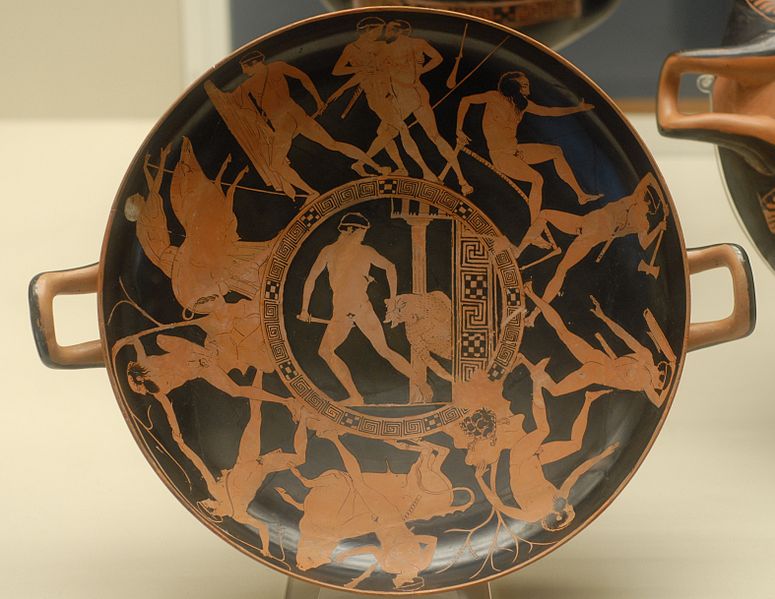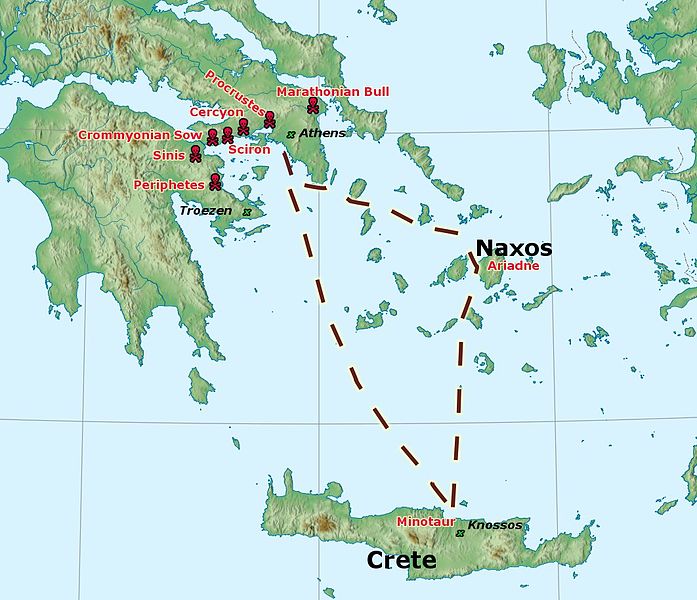THE LABOURS OF THESEUS IN GREEK MYTHOLOGY
The Six Labours of Theseus
Theseus is one of the most famous heroes of Greek mythology, ranking perhaps only second to Heracles in terms of fame and deeds.
Heracles is well known for completing his Twelve Labours, as set by King Eurystheus, but as a young man, Theseus also had his own Labours to undertake.
Heracles is well known for completing his Twelve Labours, as set by King Eurystheus, but as a young man, Theseus also had his own Labours to undertake.
The Road to Athens
|
When of age, it became time for Theseus to claim his birth right, for Theseus was the son of King Aegeus of Athens, this involved leaving Troezen and making for Athens. This journey would have been straightforward, if going by the sea route, but instead Theseus decided to go by foot along the road around the Saronic Gulf.
This road would take Theseus past six entrances to the Underworld, and it was said that in the vicinity of each entrance resided a bandit who was deadly for the unwary traveller. |
Theseus and Periphetes
The first entrance to the Underworld was at Epidaurus, and there was to be found Periphetes, a son of Hephaestus. Periphetes was cycloptic in appearance and was also lame. Periphetes was known as the Club-Bearer for he wielded a bronze club which he used to beat those he robbed into the ground.
When Theseus encountered Periphetes he would take the club from the bandit, and beat him into the Earth, just as Periphetes had done to so many travellers. Theseus may then have kept Periphetes’ club as his own.
When Theseus encountered Periphetes he would take the club from the bandit, and beat him into the Earth, just as Periphetes had done to so many travellers. Theseus may then have kept Periphetes’ club as his own.
Theseus and Sinis
|
On the Isthmus of Corinth Theseus would then encounter a robber named. Sinis was given the epithet of “Pityocamptes”, “he who bends Pine trees”, for this was the method by which he killed travellers he had caught; travellers would be tied between fir trees, which had been bent over, and when the fir trees were released, these travellers would be torn in two.
Sinis was of course overcome by Theseus, and the robber then suffered the same fate as those he had robbed. |
|
Sinis also had a beautiful daughter, Perigune, and Theseus would sleep with her, resulting in the first male heir of Theseus, Melanippus.
Theseus and the Crommyonian Sow
Continuing along the road, Theseus would come to Crommyon. The land here was being ravaged by a monstrous offspring of Typhon and Echidna, the Crommyonian Sow. This beast though was easily overcome by Theseus, just as many of the animals faced by Heracles in his Labours had been faced. Theseus was thus said to have killed the Crommyonian Sow.
Some say that the Crommyonian Sow was called Phaea, others assert this was name of the old woman who raised the pig, whilst others claim that the Crommyonian Sow was not a beast at all, but rather the name given to a female bandit (named Phaea) who accosted travellers.
Some say that the Crommyonian Sow was called Phaea, others assert this was name of the old woman who raised the pig, whilst others claim that the Crommyonian Sow was not a beast at all, but rather the name given to a female bandit (named Phaea) who accosted travellers.
Theseus and Sciron
|
Travelling on, at a point near Megara, named the Scironian Rocks, Theseus encountered another robber, this time the elderly Sciron. Along a narrow cliff top path, Sciron would stop travellers, forcing them to cleanse his feet. As these travellers knelt, so Sciron would kick them over the cliff edge, where below a giant turtle waited to devour the fallen travellers.
Theseus would hurl Sciron from the cliff where Sciron himself was devoured by the turtle. Theseus and CercyonNear to Eleusis, Theseus encountered the King of Eleusis, a cruel ruler named Cercyon. Of enormous strength, Cerycon would challenge travellers to a wrestling bout, promising his kingdom if he was bested, of course Cerycon always won, at least until Theseus came along.
Theseus, using skill rather than brute strength, managed to lift Cercyon up, and dashed him on the ground, killing him. This fifth Labour of Theseus would have made Theseus king of Eleusis, but instead, Theseus gave the kingdom to Hippothous, the grandson of Cercyon. It was also said that Theseus also slept with the daughters of Cercyon. |
|
Theseus and Procrustes
The sixth Labour undertaken by Theseus on his way to Athens, also occurred near Eleusis, for the Greek hero would meet a bandit named Procrustes (or Polypemon). Procrustes would seemingly generously offer a traveller a bed for the night. Procrustes would make sure the bed matched the dimensions of the traveller, not by adjusting the bed, but by adjusting the traveller. Thus the traveller who did not fill the bed, would be stretched until they were tall enough, whilst those who were too tall would have their feet cut off.
Theseus would take Procrustes’ axe off of the bandit, and used it on him, chopping off his feet, and decapitating him.
Theseus would take Procrustes’ axe off of the bandit, and used it on him, chopping off his feet, and decapitating him.
Theseus Arrives in AthensBy completing these six Labours, Theseus had cleared the route from Troezen to Athens, and now it would prove a less deadly journey for those who travelled the road by foot.
Theseus himself was not yet clear of danger though, for Medea was the consort of King Aegeus in Athens, and she had no wish to see an heir of the king supplant her son, Medus, as the next king of Athens. |
|
|
Colin Quartermain -The Labours of Theseus - 3rd February 2020

